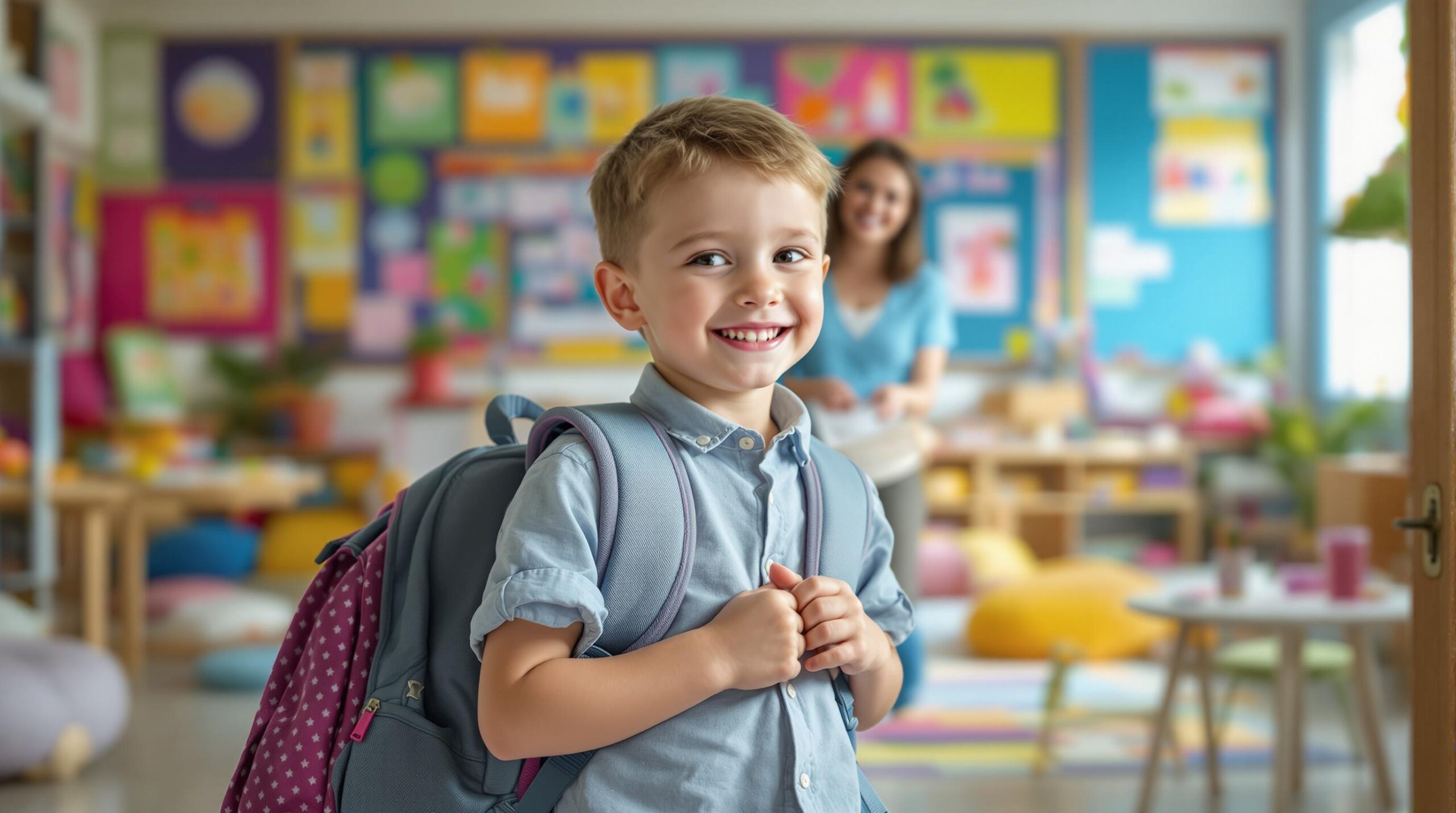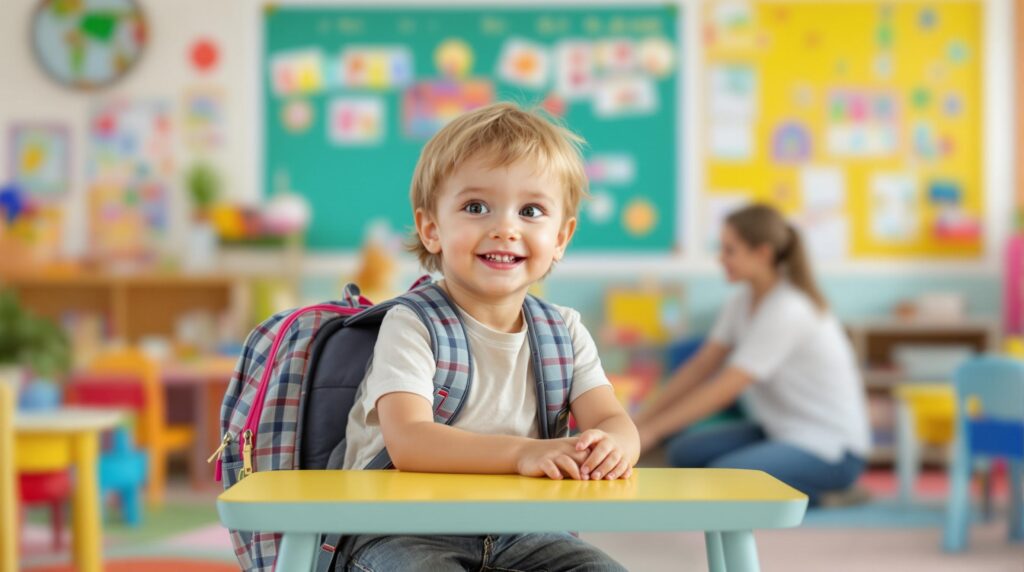Table of Contents
ToggleThe transition from preschool to kindergarten is a significant milestone in a child’s life. As a parent, you play a crucial role in preparing your little one for this exciting journey. I’ve put together a comprehensive guide to help you navigate this transition smoothly, ensuring your child is ready for the new challenges and experiences that await them in kindergarten.
Understanding Developmental Milestones for Kindergarten Readiness
Preschoolers, typically aged 3-5 years, undergo rapid development in various areas. It’s essential to understand these milestones to gauge your child’s readiness for kindergarten.
Cognitive Development
By age 3, most children can point to named body parts, identify familiar objects in picture books, and solve simple puzzles. As they approach 4, they often start reciting poems, singing songs, and grasping basic grammar concepts. They also begin to identify colors and numbers.
Around age 5, children usually can differentiate between real and pretend scenarios, tell stories, and use future tense in their speech. These cognitive skills form the foundation for more complex learning in kindergarten.
Social-Emotional Development
Preschoolers engage in pretend play, show affection, and increasingly interact with other children. By age 3, turn-taking and cooperative play emerge, replacing the parallel play seen in younger toddlers. These social skills are crucial for successfully transitioning to kindergarten, where group activities and peer interactions become more frequent.

Building Essential Social Skills for Kindergarten Success
Social skills are paramount for a smooth transition to kindergarten. Encouraging interaction with peers and adults helps your child develop these crucial abilities.
Encouraging Peer Interactions
Set up playdates or join parent-child groups to provide opportunities for your child to interact with peers. These experiences allow them to practice sharing, turn-taking, and conflict resolution – all essential skills for kindergarten success.
Role-Playing and Group Activities
Engage your child in role-playing scenarios that mimic classroom situations. This can help them understand appropriate behavior in different settings. Group activities like board games or team sports can also foster cooperation and teamwork skills.
Remember, social skills development is directly linked to better adjustment in kindergarten and future academic success. Children who can interact well with others often find it easier to focus on learning in the classroom environment.
Fostering Emotional Readiness for the Big Transition
Emotional readiness is just as important as academic preparedness when it comes to kindergarten transition.
Managing Emotions
Teach your child to identify and express their emotions appropriately. Use books, games, or discussions to explore different feelings and ways to handle them. This emotional intelligence will serve them well in the diverse social landscape of kindergarten.
Developing Independence
Encourage your child to complete age-appropriate tasks independently. This could include dressing themselves, packing their backpack, or cleaning up after playtime. These skills boost confidence and prepare them for the increased responsibilities in kindergarten.
Addressing Separation Anxiety
Separation anxiety typically peaks around 12 months but can resurface during major transitions like starting kindergarten. By age 3, most children have developed object permanence, understanding that you’ll return even when out of sight. However, some may still struggle with separation.
Practice gradual separation by leaving your child with trusted caregivers for short periods, gradually increasing the duration. This helps build trust and confidence in your return, easing the transition to full school days.
Promoting Cognitive Development Through Play and Learning
Cognitive skills form the foundation for academic success in kindergarten. Engaging your child in play-based learning activities can significantly boost these skills.
Puzzles and Problem-Solving
Introduce age-appropriate puzzles to enhance logical thinking and problem-solving skills. Start with simple puzzles and gradually increase complexity as your child’s skills improve.
Reading and Language Development
Read to your child daily, pointing out letters, words, and discussing the story. This not only enhances language skills but also fosters a love for reading – a crucial skill for kindergarten and beyond.
Counting and Number Recognition
Incorporate counting into daily activities. Count steps as you climb stairs, pieces of fruit during snack time, or cars you see on the road. By age 4, most children can count to 10 and recognize some numbers.
Exploration and Discovery
Encourage your child’s natural curiosity. Set up simple science experiments, go on nature walks, or create an exploration corner at home. These activities stimulate cognitive development and instill a love for learning.
Ensuring Physical Readiness for Kindergarten Activities
Physical readiness is often overlooked but is crucial for a successful kindergarten experience.
Gross Motor Skills
Encourage activities that develop gross motor skills like running, jumping, and climbing. These skills are essential for participation in physical education classes and playground activities.
Fine Motor Skills
Developing fine motor skills is crucial for writing, drawing, and using scissors – all common kindergarten activities. Engage your child in activities like coloring, play dough manipulation, or stringing beads to enhance these skills.
By age 4, most children can hop on one foot, stand on one foot for 2 seconds, and use scissors to cut paper. If your child struggles with these skills, don’t worry. Each child develops at their own pace, and there’s still time for improvement before kindergarten starts.
Creating a Supportive Environment at Home and Preschool
A supportive environment both at home and in preschool can significantly ease the transition to kindergarten.
Home Learning Environment
Create a dedicated learning space at home where your child can engage in quiet activities like reading or drawing. This helps establish a routine and mindset conducive to learning.
Open Communication
Encourage your child to talk about their day, their feelings about starting school, and any concerns they might have. This open dialogue helps address anxieties and builds excitement for the upcoming change.
Preschool Selection
When selecting a preschool, consider programs that align with your child’s developmental needs and prepare them for kindergarten. The NICHD Study highlights the importance of diverse childcare environments in promoting children’s development.
Effective Communication with Teachers and Schools
Building a strong relationship with your child’s future teachers and school is crucial for a smooth transition.
Sharing Information
Provide teachers with information about your child’s developmental milestones, strengths, and challenges. This helps them understand your child’s unique needs and tailor their approach accordingly.
Participating in Orientation Programs
Attend school orientation programs and open houses. These events provide valuable information about the school’s curriculum, policies, and expectations. They also offer an opportunity for your child to familiarize themselves with the new environment.
Ongoing Communication
Establish open lines of communication with teachers from the start. Regular check-ins can help address any issues promptly and ensure your child’s needs are being met.
Preparing for the First Day of Kindergarten
The first day of kindergarten is a big milestone. Proper preparation can help make it a positive experience for both you and your child.
Discussing School
Talk positively about school in the weeks leading up to the first day. Share your own fond school memories or read books about starting school to build excitement.
Visiting the School
If possible, visit the school before the first day. Familiarize your child with the classroom, playground, and other key areas. This can significantly reduce anxiety on the first day.
Establishing Routines
Start implementing school-day routines a few weeks before school starts. This includes earlier bedtimes, morning routines, and practice with school lunches.
Encouraging Questions
Teach your child to ask questions and express their feelings about starting school. Address their concerns honestly and reassuringly.
Preparing Yourself
Don’t forget to prepare yourself emotionally for this transition. It’s normal to feel a mix of excitement and anxiety. Remember, your child will pick up on your emotions, so try to stay positive and confident.
By following these guidelines, you’ll be well-equipped to support your preschooler’s transition to kindergarten. Remember, every child is unique and may require different levels of support. Trust your instincts as a parent and don’t hesitate to seek additional guidance if needed. With patience, preparation, and positivity, you can help make this transition an exciting and rewarding experience for your child.
Sources:
National Institute of Child Health and Human Development – NICHD Study of Early Child Care and Youth Development
PubMed – Developmental Milestones
High Speed Training – Child Development in Early Years
U.S. Department of Health and Human Services – Consumer Education Websites











